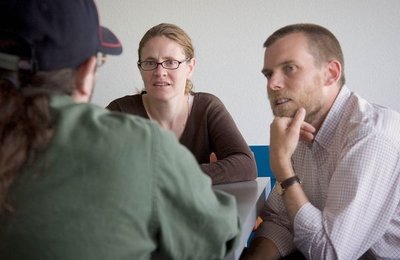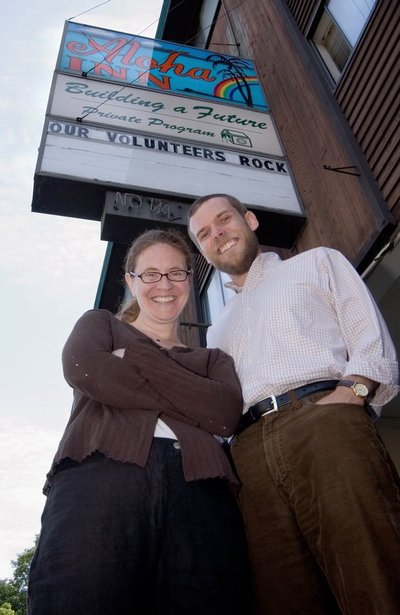August 3, 2006
Healing at the Aloha Inn: Student-run clinic at transitional housing facility a boon to residents
When Brian Johnson graduated from medical school this year, he left a living legacy — a student-run free clinic at the Aloha Inn, a transitional housing facility in Seattle’s Queen Anne neighborhood.
“The question was how do you train students to serve underserved communities and to understand the lives and issues of those populations, when they don’t have exposure to them?” Johnson said. “The Aloha Inn offered the perfect situation to both train students and help people who may not get the health care they need.”
The Aloha Inn provides transitional housing for 66 formerly homeless residents. Residents must be 18 or older. The inn provides shelter for up to nine months. All residents are awaiting the availability of permanent housing and must have an income source, either from disability or employment.
Danielle Wise, program co-manager, explained that in the world of transitional housing, the Aloha Inn is unusual. “There are two unique things about our program. One is that residents must save $80 per week, so that at the end of their stay they will have the first and last month’s rent, and hopefully a little cushion. The other is that the program is managed by the residents themselves. They do all of the daily operations and they make and enforce the rules.”
Johnson said the motivation of the residents provided an ideal opportunity to create an on-site clinic. By the time people come to the Aloha Inn, many are in a time of transition and are ready to make big changes.
“The residents here are highly motivated people — they are in a situation where they are working, quitting old habits and taking major steps to improve their lives,” he said. “Having a clinic in such an environment encourages innovative health interventions by allowing us to have frequent resident encounters.”
The Students in the Community (SITC), an interprofessional student-run free clinic, is the brainchild of Johnson and two other UW medical school students, Christine Dehlendorf and Elizabeth Hutchison. The first clinic at the Aloha Inn occurred in the spring of 2004.
Each Sunday, students from across the health sciences professions set up their clinic at the Aloha Inn. Students from medicine, nursing, social work, public health, occupational health, pharmacy and physician assistants programs care for the patients under the guidance of an on-site physician preceptor. Laura Gottlieb, chief resident for family medicine at Harborview Medical Center, and Johnson’s spouse, was one of this past year’s physician preceptors. The program is administered by the Center for Health Science Interprofessional Education, a UW organization with faculty representation from across the health sciences. UW Medical Center provides all of the medical supplies used in the clinic.
The goals of the program are multiple: provide quality community-oriented health services to the underserved community using interprofessional teams; collaborate with community organizations to expand projects that effectively serve these populations; increase awareness within the UW health care community of the social, cultural, and economic issues affecting the underserved; promote an ethic of service in the UW health sciences; and provide service-oriented leadership experience to prepare students for a life of activism.
Many people who are homeless often wait until an acute health problem occurs before seeing a health care provider. “When they finally see a physician, that’s when health care providers also find problems like hypertension or asthma that need to be more chronically managed,” Johnson said. The SITC clinic allows residents to get help for those more chronic issues without leaving home.
“Our model offers more one-on-one time with providers,” said Johnson. “It also encourages residents to actively participate in their own health care by promoting changes in diet, exercise, and behavior.” Mental health/depression and hypertension are the most frequent chronic health problems seen at the clinic. Other illnesses seen and treated include diabetes, skin problems, upper respiratory problems, asthma, and alcohol and drug abuse. When residents need more medical care than the students can provide, and do not already have a regular health care provider, they are generally referred to the Harborview Family Medicine Clinic for primary care.
Residents who have taken advantage of the clinic are grateful that they have an on-site home clinic that provides quality care.
“When you’re homeless, most people have aches and pains, or dental problems and you can’t afford the care when you need it. This is state of the art. I doubt if you will find any other program like this,” said one 49-year-old resident who has lived at the Aloha Inn for five months. “I lost my job. That’s what got me here. I’d never been homeless before.”
Another resident mentioned the students are “really knowledgeable. I can see they are going to do really well once they get out of school.”
Wise salutes Johnson and all the others who have made the clinic at the Aloha Inn a reality.
“This clinic is amazing,” she said. “Prior to the clinic most residents would have to go outside to seek services. Brian and the others have brought the services to us. They provide referrals to outside agencies (that would be otherwise difficult to get). With the clinic here, where people are living, it’s much better. Students take their time with the residents; they take time to get the complete picture of the person’s health. The clinic has brought the conversation of health into our program.
“Brian has helped to create a clinic where there’s an established connection between social service agencies, the community, and the University — the clinic bridges the gap.”
Johnson and Gottlieb will continue their mission of service in Albuquerque, N. M., where Johnson will be a resident in the Family Medicine program at the University of New Mexico, and Gottlieb will join the North Valley Clinic of First Choice Community Healthcare.
Johnson is confident the next group of health care students to serve Aloha residents will only add to his vision of serving communities that are underserved.
“We have built a foundation that feels like it will be sustainable, and we’re leaving it in good hands,” he said. “The current students have the energy, organizational and leadership skills to take this project to the next level, to increase the impact on community and the learning for students.
“It will expand the clinic’s level of professionalism and ultimately the services we provide to this underserved population.”




